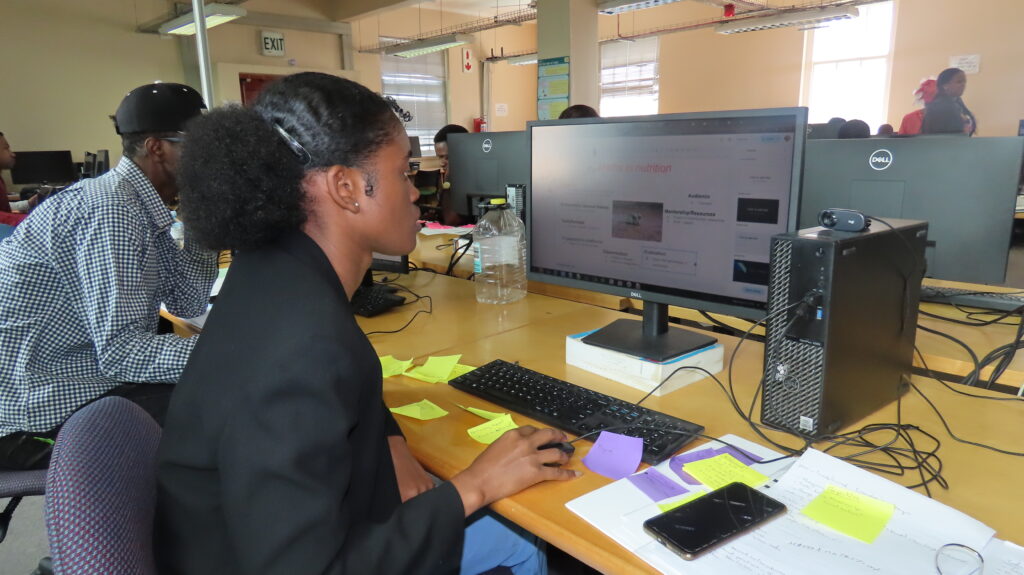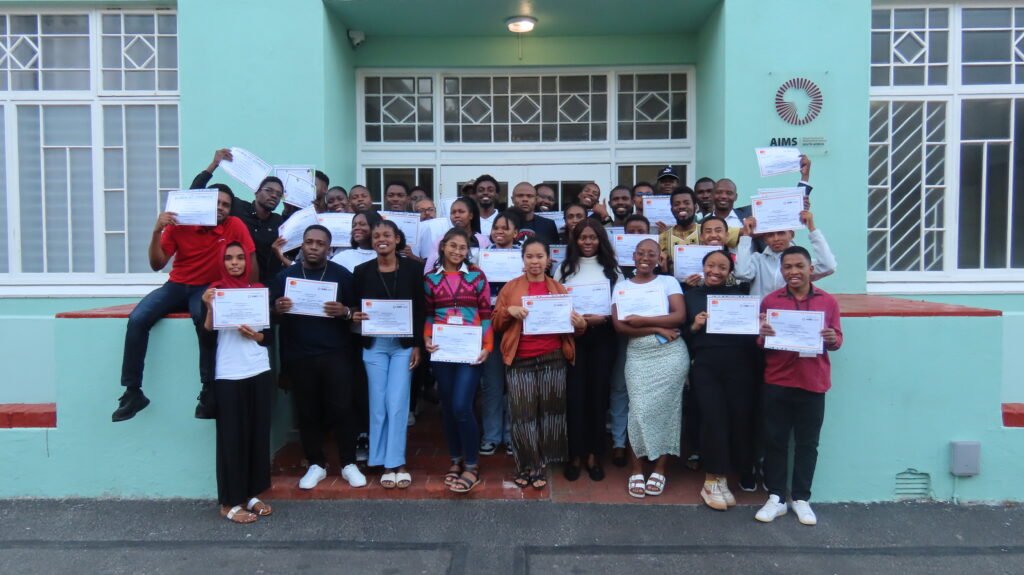Following the successful kick-off of the 2025 Africa Scientifique: Leadership, Knowledge, and Skills for Science Communication annual three-phase programme’s Introductory Workshop (Phase 1) in February, AIMS South Africa, in partnership with African Gong, continued its journey with Phase 2 of this transformative Afrocentric capacity-building initiative.
Phase 1 laid a strong foundation in which the participants explored the strategic, global, historical, and contemporary dimensions of science communication. Phase 2 built on that. It featured an intensive and interactive three-day workshop dedicated to capacity building for the Mastercard Foundation Scholars at AIMS South Africa under the aegis of the Mastercard Foundation Scholars Program at AIMS Phase II.
The workshop was held from 14 to 16 April 2025 at AIMS South Africa. It provided Mastercard Foundation Scholars with a deeper, hands-on and minds-on engagement in science communication and public engagement practices. It aimed to empower them to leverage these skills for leadership, career growth, and making an impact across academia, industry, and beyond, enhancing their employability.
Opening remarks were delivered on the first day of the workshop by Prof. Karin-Therese Howell, Academic Director; Ms. Basirat Agboola, Lead of the Scholars Programme Partner Network at Mastercard Foundation; Dr. Elizabeth Rasekoala, President of African Gong; and Dr. Rejoyce Gavhi-Molefe, Manager of AIMS South Africa House of Science.
In her keynote address, Ms Agboola welcomed the participants and emphasised that the Mastercard Foundation Scholars Programme goes beyond academic excellence. She highlighted that the programme is grounded in integrity, self-awareness, and a profound sense of purpose, which are essential to building a shared identity among Mastercard Foundation Scholars.
| “Together as partners, we’re really going beyond academic excellence. It’s about inclusion, it’s about belonging, it’s about transformative leadership and service.” – Ms Agboola |
Ms Agboola further noted that Phase 2 of the Africa Scientifique training was positioned as a unique opportunity for Mastercard Foundation Scholars to develop their advocacy skills, accelerate their early careers, and build strong networks across academia, government, and industry.
| “We are really encouraging you to soak this all up and to take it as an excellent foundation to deepen your network,” she added |
She reminded Mastercard Foundation Scholars that they were selected not only for their academic brilliance but also for their potential to lead, innovate, and give back. She encouraged participants to embrace the journey ahead, stay connected, support one another, and never lose sight of their purpose.
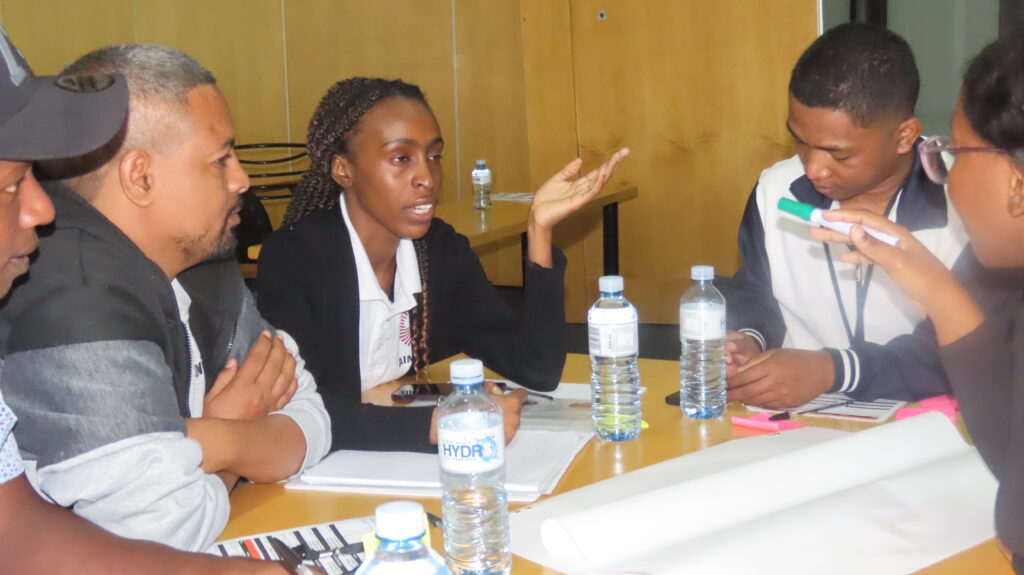
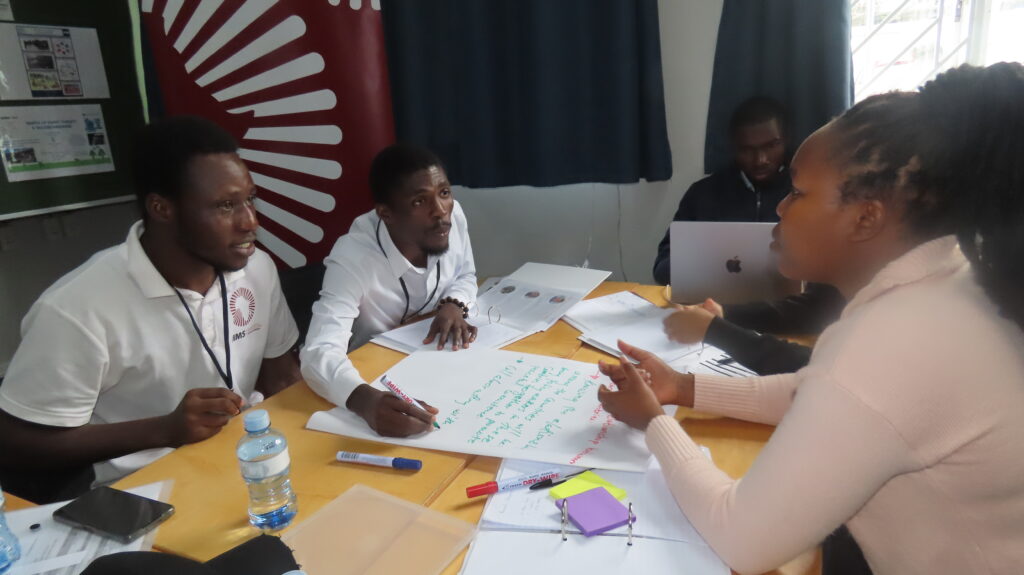
Over three days, participants engaged in hands-on, minds-on, informative, transformative, mindful, and highly interactive programmes and networking opportunities. The House of Science Manager, African Gong President, and experts in science communication facilitated the workshop. Mathematical scientists and AS Programme alumni cohorts currently pursuing careers in academia and industry also contributed to the workshop during this period, serving as role models and mentors to create a transformative, inclusive, and mentoring capacity-building experience.
The workshop featured rich, diverse sessions that framed globally inclusive yet Afrocentric discourses, narratives, and good practice developments aimed at transforming the participants’ understanding and enhancing their commitment to equity, ethics, and hands-on public engagement actions in the future. Inherent in these good practices was solidarity with African publics, foregrounding African local and Indigenous languages for science communication and public engagement across the continent, contextualised within socio-cultural dimensions, including gender inclusion.
During the workshop, Africa Scientifique Programme alumni from 2021 to 2024 shared their experiences of the transformative impact of the programme on their confidence, communication skills, career progression, and perspectives as emerging African scientists. These included Mr. Siyabonga Mthimkulu, a PhD student at AIMS South Africa and 2023 AS Alumni; Ms. Bralyne Vanessa Kamga Matoukam, a PhD candidate and AS Programme 2021 Alumni from the University of the Witwatersrand; and Mr. Esau Moyoweshumba, an educator at Jamiyyah Sayyidinaa Bilaal Institute, Zimbabwe, and 2024 Africa Scientifique Alumni.
Ms. Matoukam shared a compelling personal story of transformation – from a French-speaking student facing language and cultural barriers to becoming a confident science communicator and PhD researcher in mathematical physics.
| “English was not my first language, and I had to express scientific ideas in a language I wasn’t fully confident in. African Scientifique Workshop as a turning point. It was not just about giving a talk. It was about learning how to communicate science with clarity, confidence, and passion — especially in the African context. Now, when I have to give a presentation, I am not afraid of my audience. I speak with confidence and share my science with people.”Ms Matoukam |
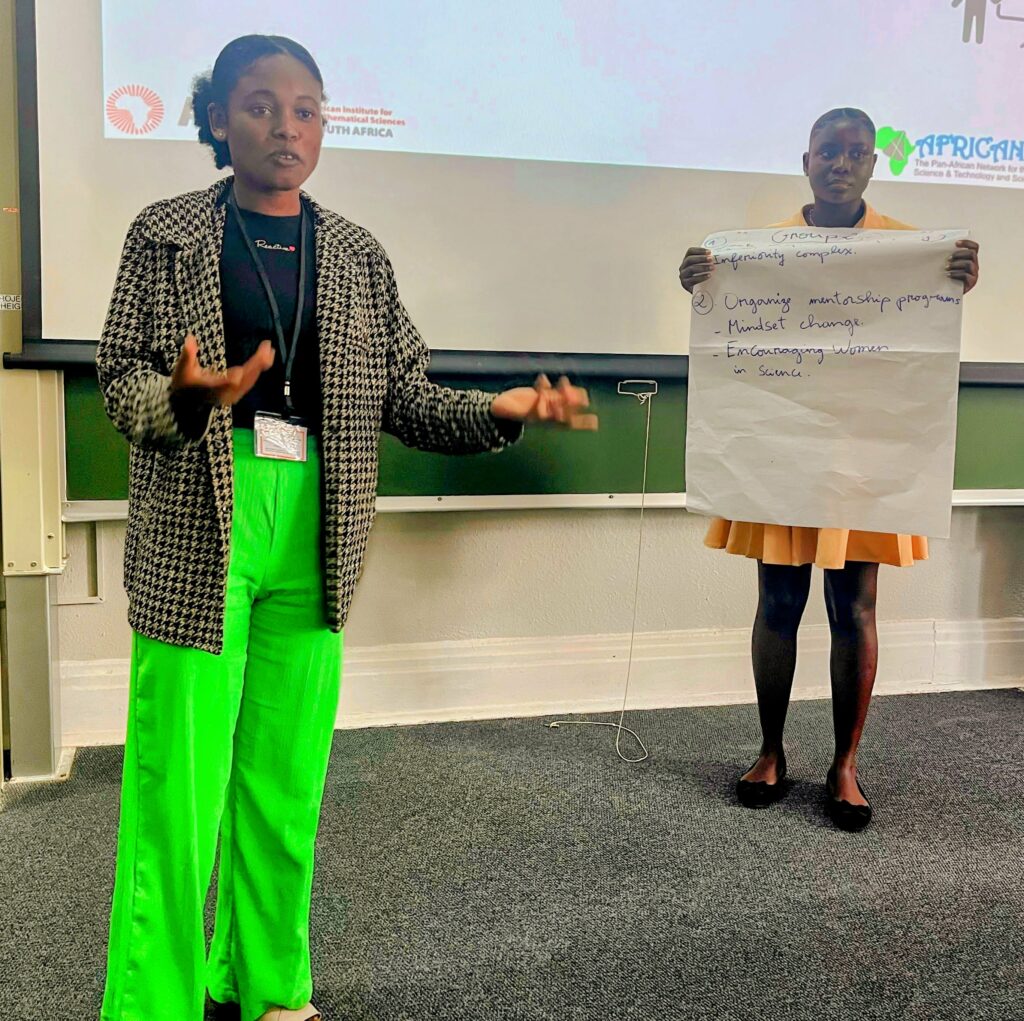
On the other hand, Mr Moyoweshumba shared with participants how he conceptualised, planned, and delivered his 6-month public engagement project, what he gained from that experience, and what the public gained from it (his project). The project was based on Boosting Taxi Business. It targeted local taxi drivers in Muizenberg Capricorn, intending to empower them with tools to analyse their daily business operations and profit.
Mathematical scientists and AIMS Alumni, Dr Mary Ajibola Familusi (Postdoctoral Research Fellow: University of Cape Town) and Mr Rockefeller (PhD Candidate: AIMS South Africa/Stellenbosch University & Data Scientist at Morae Global Corporation, Cape Town) also contributed to the workshop. During the panel discussion, they shared diverse lived experiences, insights, practical techniques, and strategies for advancing and leveraging science communication skills and opportunities in academic and industrial career progression pathways.
| “Be intentional about growth as a science communicator” – Mr Mthimkulu“Leave your comfort zone. Learn how to communicate with a diverse audience – Rockefeller“Take feedback seriously in your science communication journey” – Dr Familusi |
Workshop Outcomes and Participants’ Testimonials
| “The workshop content was timely as the need is great, especially since we are also working on our MSc theses. The project phase is a good push out of our comfort zone. I see science communication as a critical component to ensure my absorption in the job market and also ensure leadership opportunities of my interest. This workshop has been affirming of my potential, especially in public speaking and scientific communication.” |
| “To achieve Afrocentricity science communication across Africa, we need to embrace our cultures in research, communicate in our languages, community involvement and capacity building” |
| “Gender inclusion matters in the global development of science communication. Men and women should have equal opportunity to contribute their best to the engagement efforts.” |
| “I like the idea of students pitching their project ideas because this enhances their public speaking skills and could also lay the foundation for them during job interviews.” |
| “I learnt about a good framework for planning and designing public engagement projects. I learnt the importance of monitoring and evaluation to assess the delivery of strategic outcomes and the importance of time management.” |
| “I really appreciate the organisation, the panellists and all the resources we have. I really appreciate the initiative, and for me it will be very important to think about how we can extend these activities across the continent.” |
Ms Ruth Naayi Odankey Abbey, Mr Clinton Paye Quee and Ms Perpetual Naomi Avornor, structured Master’s students at AIMS South Africa, directed the workshop as part of their leadership training. Ms Noluthando Sithole assisted with logistics as part of her Internship training.
| I am grateful to have been given the opportunity to serve, and truly, the experience was enriching. Of course, I learned a lot from serving as a program director on April 15. I also solicited feedback from some of my colleagues regarding my performance, and they willingly gave me their honest opinion. – Mr Clinton Paye Quee |
What’s Next? The 6-month Post-Workshop Science Communication Project Activities Mentoring & Delivery
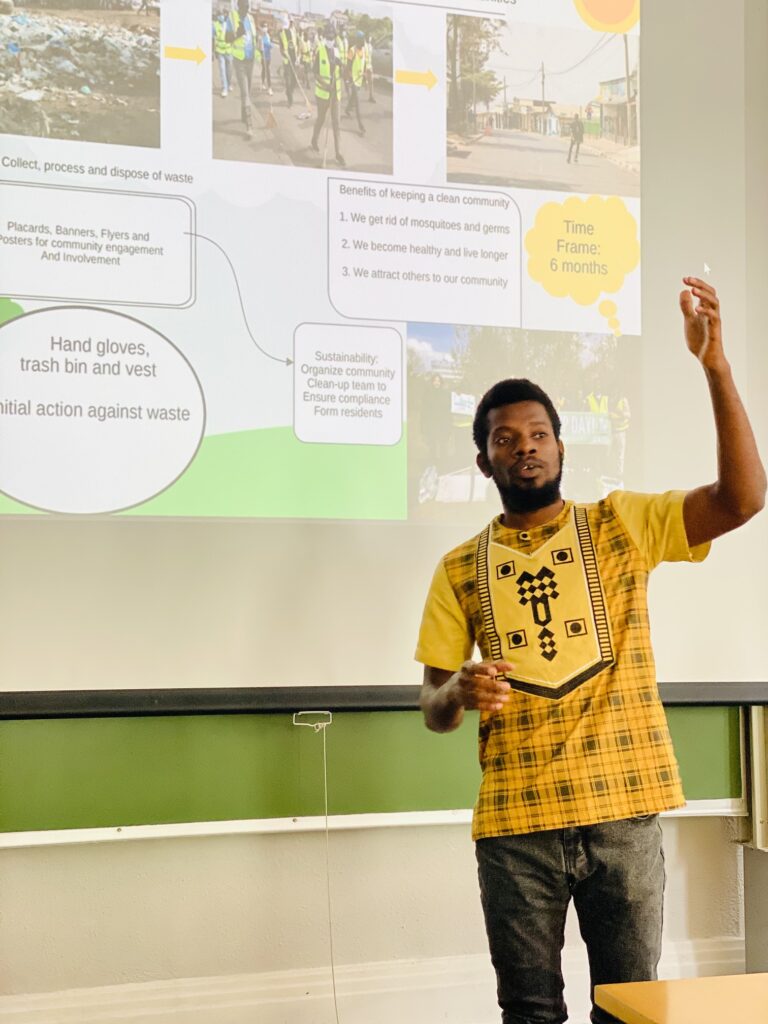
The last day of the 3-day workshop offers participants the opportunity to put into practice what they learned from the Day 1 and Day 2 sessions through practical exercises. They conceptualised, designed, and presented individual practical science communication community project frameworks in three minutes, using one PowerPoint slide. They will deliver those projects in Muizenberg and surrounding areas and their home countries’ communities during the post-workshop mentoring phase (i.e., Phase 3, May – October 2025). The projects encourage participants to share their mathematical knowledge and address societal challenges in their respective communities. They are expected to do so with special emphasis on Afrocentricity and adapting public engagement methods to local contexts to enhance learning experiences, accessibility, and impact.
The participants are already excited about the opportunity and are ready to embark on the third leg of their science communication journey with their newly acquired knowledge and skills while sharing their short- and long-term communication goals.
| “The projects are a very good approach in ensuring the impact of the workshop. I love the idea. Pitching was a great start towards project implementation. Presentations pushed us out of our comfort zone. Listening to my fellow peers pitch their ideas made me appreciate the brilliance in the room. I will be working on actualizing my project ” Let’s Talk: AI Human Factor!”. The target audience is critical in delivering this project. I hope to get clearance with AIMS to approach the Church and Waves for Change Organisation.” |
| “The Africa Scientifique programme has offered wonderful content and intentions. I will take this workshop to be a starting point for my science communication in my career to enhance my employability and the impact of my knowledge in my community. The programme has given me a boost of self-confidence in public speaking, even though I am not yet where I want to be. After this workshop, I will challenge myself to communicate my knowledge and my research project so that I will see the impact within my stay at AIMS.” |
| “These three days have been very educative and transformative. I have learnt a lot, which I believe will be helpful in my science communication and leadership skills. I believe science communication is very essential for my career progression as a lecturer and researcher. I have been able to improve my writing and presentation skills. I would want to communicate the knowledge I have gained from this workshop to my peers who have not been privileged to have such” |
| “The content was well organised and excellently delivered over the three days. It was particularly interactive and offered useful feedback. It has helped me improve my communication and teamwork skills. I learned how to convey technical ideas clearly. I also identified weaknesses and gaps in my communications. After the workshop, I will implement my project on educating local communities about the danger of betting through the language of mathematics” |
| “This workshop was so important for our own career progression. During that 3-day Africa Scientifique, I learnt some qualities of presentation and also how to be a good leader in a community. After this, I will constantly share my scientific knowledge in an efficient way with my community.” |
